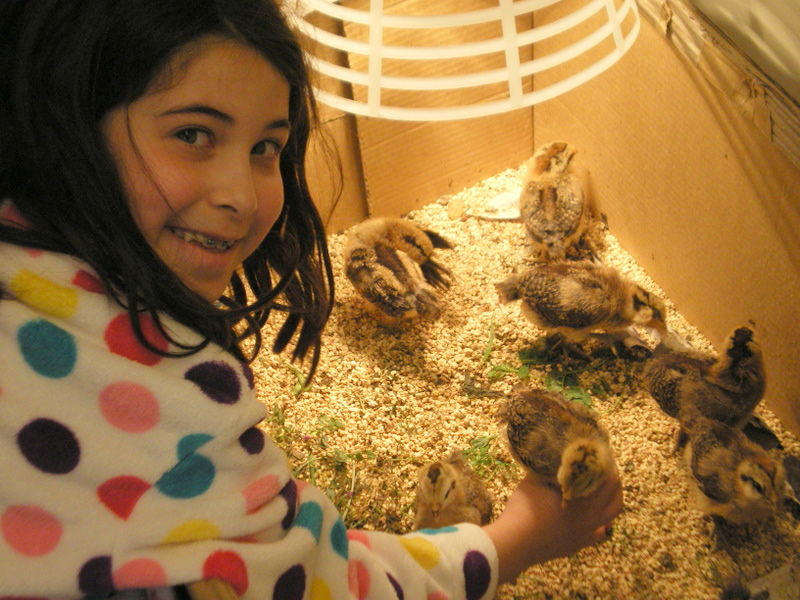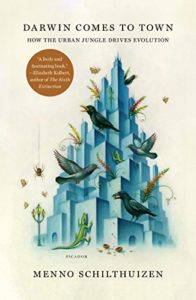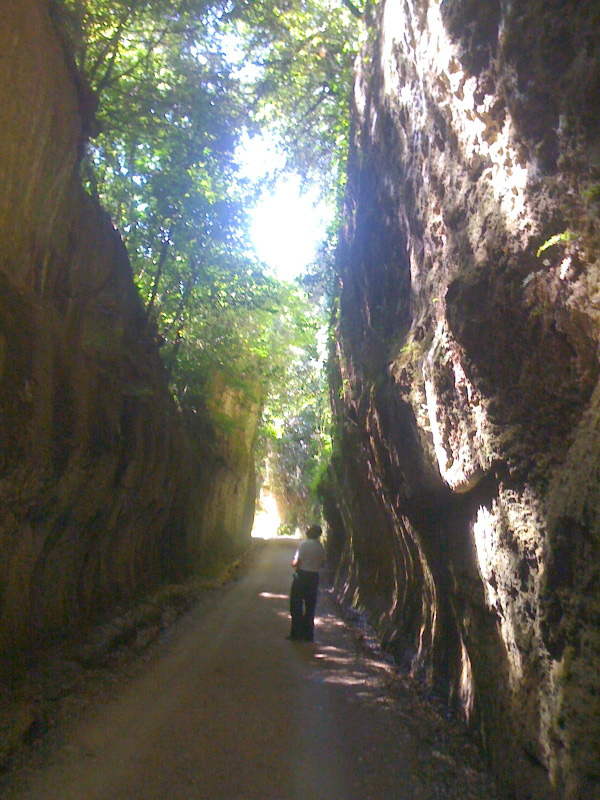
It seems to me that chickens are the perfect eco-accessory. Here they are, a few days old, when they were still in the laundry room.
They grow quickly, provide eggs and meat, and are omnivores. I ground up the remains of the fish stock and they gobbled it—no more smelly mess in the garbage. They eat weeds, bugs, snails and slugs. I’m planning to make a “chicken tractor” to move them around to various parts of the garden. I wonder if I’d still like them as much without the knowledge of future eggs? There is really no comparison between the eggs from a backyard chicken that gets to roam and eat grass and bugs to those sold commercially. Larry says the yolks are the color of a Van Gogh sun. Of course, here in the suburbs, no roosters, which is too bad. I understand that others may not be charmed by the rooster alarm clock. They do crow incessantly, starting before dawn. When I was in Puerto Rico, surrounded by households with roosters I wondered: is a rooster’s crow the sound of poverty or of affluence? In any case, a small, well-tended flock of chickens is pretty delightful. I saw this poem about chickens years ago and saved it.
Passing a Truck Full of Chickens at Night on Highway Eighty
Some were pulled by the wind from moving
to the ends of the stacked cages,
some had their heads blown through the bars—
and could not get them in again.
Some hung there like that—dead—
their own feathers blowing, clotting
in their faces. Then
I saw the one that made me slow some—
I lingered there beside her for five miles.
She had pushed her head through the space
between bars—to get a better view.
She had the look of a dog in the back
of a pickup, that eager look of a dog
who knows she’s being taken along.
She craned her neck.
She looked around, watched me, then
strained to see over the car—strained
to see what happened beyond.
That is the chicken I want to be.
Jane Mead, The Lord and the General Din of the World
I don’t know anything about Jane Mead, but the following poem, also about a bird seen driving at night, was written by a woman who died fairly young from a chronic and degenerative disease. It’s a level darker and deeper:
Night Owl
You are nearing the land that is life,
You will recognize it by its seriousness.
Rilke
Diving my bad news the back way home
I know I’m in the land that is life
when I reach my favorite stretch of road—fields
flat and wide where corn appears soon after
planting the soil tilled, night-soaked
and crumbled into fists.
Ferguson’s barn is somewhere
at the end of this long arm of tar
and as I near it, something grazes the back
passenger-side door, luffs parallel to my car—
a huge owl on headlight spray floating,
holding night over the hood to see
if this moving thing is real, alive,
something to kill—then gliding in
close as if to taste glass.
The road levitates, buffeted on a surf
of light, the fog-eaten farm disappearing
as I ride into starlessness, cells conspiring
so I am bright-flecked and uplifted—is this
what it feels like to be chosen—to be taken
under the wing of something vast
that knows its way blindly?
M. Wyrebek, Be Properly Scared
 I just finished this book, Darwin Comes to Town by Menno Shilthuizen, about adaptation and evolution in urban environments, which seemed somewhat hopeful. It’s a discussion about how quickly certain species change to thrive in cities. Stories include the hawksbeard dandelion, which evolved to produce heavier seeds so their little parachutes would keep them in the island of green instead of floating off onto asphalt and how crows learn to throw heavy-shelled walnuts into intersections, wait for cars to run over them and then when the light changes, run out to grab the walnut meat after the cars crush the shells.
I just finished this book, Darwin Comes to Town by Menno Shilthuizen, about adaptation and evolution in urban environments, which seemed somewhat hopeful. It’s a discussion about how quickly certain species change to thrive in cities. Stories include the hawksbeard dandelion, which evolved to produce heavier seeds so their little parachutes would keep them in the island of green instead of floating off onto asphalt and how crows learn to throw heavy-shelled walnuts into intersections, wait for cars to run over them and then when the light changes, run out to grab the walnut meat after the cars crush the shells. I don’t give to panhandlers. I give to anyone playing a musical instrument or other attempt at entertainment, and the people who sell the street newspaper. The only exception I’ve made was a singer in the NY subway who I passed on a regular basis and wanted to encourage to QUIT! The other day, I passed a very pregnant woman with a sign “Traveling, broke, hungry.” I gave her an orange. I guess that counts as an exception, too. When I don’t give, I make eye contact, nod, and say, “Not today.”
I don’t give to panhandlers. I give to anyone playing a musical instrument or other attempt at entertainment, and the people who sell the street newspaper. The only exception I’ve made was a singer in the NY subway who I passed on a regular basis and wanted to encourage to QUIT! The other day, I passed a very pregnant woman with a sign “Traveling, broke, hungry.” I gave her an orange. I guess that counts as an exception, too. When I don’t give, I make eye contact, nod, and say, “Not today.”